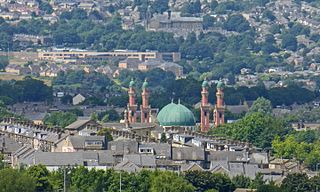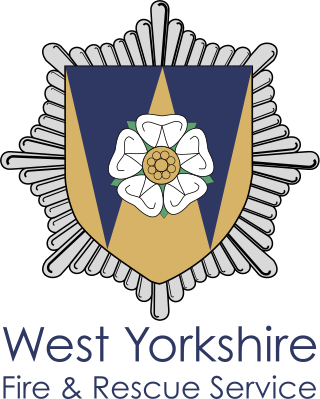District councils
Bradford
Wards from 1 April 1974 (first election 10 May 1973) to 1 May 1980: [1]
Wards from 1 May 1980 to 10 June 2004: [2]
Wards from 10 June 2004 to present: [3]

- Baildon (3)
- Bingley (3)
- Bingley Rural (3) †
- Bolton & Undercliffe (3)
- Bowling & Barkerend (3)
- Bradford Moor (3)
- City (3)
- Clayton & Fairweather Green (3)
- Craven (3)
- Eccleshill (3)
- Great Horton (3)
- Heaton (3)
- Idle & Thackley (3)
- Ilkley (3)
- Keighley Central (3)
- Keighley East (3)
- Keighley West (3)
- Little Horton (3)
- Manningham (3)
- Queensbury (3)
- Royds (3)
- Shipley (3)
- Thornton & Allerton (3)
- Toller (3)
- Tong (3)
- Wharfedale (3)
- Wibsey (3)
- Windhill & Wrose (3)
- Worth Valley (3) †
- Wyke (3)
† minor boundary changes in 2008 [4]
Calderdale
Wards from 1 April 1974 (first election 10 May 1973) to 1 May 1980: [1]
Wards from 1 May 1980 to 10 June 2004: [5]
Wards from 10 June 2004 to present: [6]

- Brighouse (3)
- Calder (3)
- Elland (3)
- Greetland & Stainland (3)
- Hipperholme & Lightcliffe (3)
- Illingworth & Mixenden (3)
- Luddendenfoot (3)
- Northowram & Shelf (3)
- Ovenden (3)
- Park (3)
- Rastrick (3)
- Ryburn (3)
- Skircoat (3)
- Sowerby Bridge (3)
- Todmorden (3)
- Town (3)
- Warley (3)
Kirklees
Wards from 1 April 1974 (first election 10 May 1973) to 6 May 1982: [1]
Wards from 6 May 1982 to 10 June 2004: [7]
Wards from 10 June 2004 to present: [8]

- Almondbury (3)
- Ashbrow (3)
- Batley East (3)
- Batley West (3)
- Birstall & Birkenshaw (3)
- Cleckheaton (3)
- Colne Valley (3)
- Crosland Moor & Netherton (3)
- Dalton (3)
- Denby Dale (3)
- Dewsbury East (3)
- Dewsbury South (3)
- Dewsbury West (3)
- Golcar (3)
- Greenhead (3)
- Heckmondwike (3)
- Holme Valley North (3)
- Holme Valley South (3)
- Kirkburton (3)
- Lindley (3)
- Liversedge & Gomersal (3)
- Mirfield (3)
- Newsome (3)
Leeds
Wards from 1 April 1974 (first election 10 May 1973) to 1 May 1980: [1]
Wards from 1 May 1980 to 10 June 2004: [9]
Wards from 10 June 2004 to 3 May 2018: [10]
Wards from 3 May 2018 to present: [11]

- Adel & Wharfedale (3)
- Alwoodley (3)
- Ardsley & Robin Hood (3)
- Armley (3)
- Beeston & Holbeck (3)
- Bramley & Stanningley (3)
- Burmantofts & Richmond Hill (3)
- Calverley & Farsley (3)
- Chapel Allerton (3)
- Cross Gates & Whinmoor (3)
- Farnley & Wortley (3)
- Garforth & Swillington (3)
- Gipton & Harehills (3)
- Guiseley & Rawdon (3)
- Harewood (3)
- Headingley and Hyde Park (3)
- Horsforth (3)
- Hunslet and Riverside (3)
- Killingbeck & Seacroft (3)
- Kippax & Methley (3)
- Kirkstall (3)
- Little London and Woodhouse (3)
- Middleton Park (3)
- Moortown (3)
- Morley North (3)
- Morley South (3)
- Otley & Yeadon (3)
- Pudsey (3)
- Rothwell (3)
- Roundhay (3)
- Temple Newsam (3)
- Weetwood (3)
- Wetherby (3)
Wakefield
Wards from 1 April 1974 (first election 10 May 1973) to 6 May 1982: [1]
Wards from 6 May 1982 to 10 June 2004: [12]
Wards from 10 June 2004 to present: [13]

- Ackworth, North Elmsall & Upton (3)
- Airedale & Ferry Fryston (3)
- Altofts and Whitwood (3)
- Castleford Central & Glasshoughton (3)
- Crofton, Ryhill & Walton (3)
- Featherstone (3)
- Hemsworth (3)
- Horbury & South Ossett (3)
- Knottingley (electoral ward) (3)
- Normanton (electoral ward) (3)
- Ossett (3)
- Pontefract North (3)
- Pontefract South (3)
- South Elmsall & South Kirkby (3)
- Stanley & Outwood East (3)
- Wakefield East (3)
- Wakefield North (3)
- Wakefield Rural (3)
- Wakefield South (3)
- Wakefield West (3)
- Wrenthorpe & Outwood West (3)












